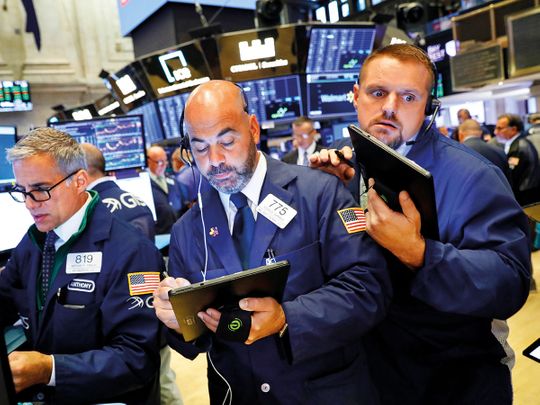
Dubai: With investors having turned increasingly cautious this past week, the choppy sentiment is expected to remain in the days ahead, as optimism of a quick post-pandemic rebound takes a back seat.
“Global bodies like the OECD and World Bank are increasingly downbeat, as were the Fed and the BOE, and the IMF is expected to downgrade its forecasts later this week as well,” cautioned Timothy Fox, Head of Research & Chief Economist at Emirates NBD.
“Meanwhile longstanding problems remain in respect to UK-EU trade talks and the EU Council meeting on Friday failed to resolve differences over the 750 billion euro recovery fund,” Fox added. “The net result is a more cautious mood all around.”
Sharp reversal in sentiment
Wall Street indexes gave up strong early gains to close mostly lower Friday, a sentiment reflected by benchmarks elsewhere in the world. However for the week, the Dow rose 1 per cent, the S&P 500 gained 1.9 per cent, and the Nasdaq returned 3.7 per cent.
The sharp reversal late last week came after the World Health Organization signaled that the coronavirus pandemic remains a deadly threat, and Apple said it will re-close some stores due to rising case counts in parts of the US, casting doubt on the speed of recovery in the world’s largest economy.
While Apple said it would re-close 11 stores in Florida, North Carolina and South Carolina, and Arizona starting on Saturday, the WHO at a Friday briefing also said that the coronavirus pandemic has entered a “new and dangerous phase” – souring investor sentiment that had earlier begun to ease.
New COVID cases cause panic, again
The announcements come amid reports of rising coronavirus cases in those states, as well as California and Texas, which all reported record-high, single-day increases on Thursday.
Now it’s becoming increasingly evident that any time a pandemic-related headline comes through during the day, markets are reacting. Several analysts still hold the view that stock markets – that had recorded strong gains the last two months – had risen ‘too much, too soon’.
In addition to that, analysts now think markets are going to be stuck largely in the same current level for a while until there’s clarity on the virus, “which could take months,” said one analyst. This means that there is a slim chance that stocks will see new highs or new lows, with the current choppiness to linger on further.
Investors search for ‘decisive catalysts’
Han Tan, market analyst at FXTM, pointed out how investors were still “searching for decisive catalysts”.
“Stock markets are now caught between competing narratives, from the risks of a second wave to the optimism surrounding the stimulus-fueled post-pandemic recovery, with simmering US-China tensions lurking in the background,” explained Han Tan.
“As investors hunt for fresh catalysts, the next major event that significantly sways global risk sentiment is set to have a major say on the market’s post-quadruple witching-trajectory.”
US-China tensions continue to simmer
While on the topic of strained US-China trade relations, stocks earlier got a boost from a report by Bloomberg that China plans to accelerate purchases of American farm goods to comply with the phase one trade deal signed in January.
Beijing intends to step up buying of everything from soybeans to corn and ethanol as the economic disruption caused by the coronavirus pandemic has meant China has only reached 13 per cent of the 2020 target under the deal in the first four months of the year.
After rising about 15 per cent in the month of May, the Dubai Financial Market (DFM) dropped 4 per cent in the last few weeks. Similarly, the Abu Dhabi Securities Market (ADX) slipped 2 per cent after rising as much as 9 percent in the month before.
On Sunday, both indexes further started the week on a bitter note, with the DFM slipping 0.9 per cent at 2,059 points, while the ADX declined 0.2 per cent at 4,334 points.
"Going forward, equity markets are likely to witness increased volatility on the back of a potential second wave and its impact on broader economies," said Iyad Abu Hweij, managing director at Allied Investment Partners PJSC.
On the DFM, it was the regional lenders that contributed most to Sunday’s declines after rating agency Moody’s over the weekend changed its outlook to negative from stable for eight banks due to the coronavirus outbreak.
The list of lenders, which included top lender Emirates NBD and Dubai Islamic Bank, resulted in shares of Emirates NBD slipping over 3.9 per cent and DIB dropped over 2.5 per cent.
Meanwhile, elsewhere in the GCC, Saudi Arabia’s stock market edged up in choppy trade after the kingdom ended a nationwide coronavirus curfew.








